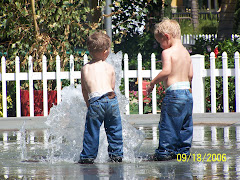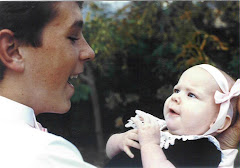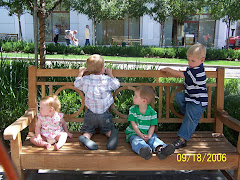Being a mother is the greatest sign of love and trust that our Father in Heaven could ever give us. As I was watching our grandchildren I was struck with awe regarding their guileless behavior. They radiate genuine purity and such innocent qualities. I never really thought about this while raising my own children. I probably was too busy with the day-to-day schedule of survival to notice this quality. The thought came to me how we have been entrusted with these little spirits in their most perfect state in life. I’m not saying that purity can only be in childhood, but I concluded never again is that child so naturally Christ-like and pure. Somehow as individuals we struggle as we get older with being humble, submissive and teachable. The natural man seems to creep in some how. How lucky we are to be given these almost perfect children in this stage of their growth during the eternities.
Several years ago when we first opened Ensign Books our front door displayed a sign which read “pull”, leftover from the previous tenant. Our front door actually swings both ways so whether one would push or pull it makes no difference. We were saddened, however, when mothers, although infrequent, would verbally berate their child for pushing instead of pulling. “Can’t you read?” or “Don’t you pay attention. The sign says pull!” We could see how the scolding was damaging to a child’s self esteem, when in reality, it made no difference whether the door was pushed or pulled. After one too many of these situations we removed the “pull” sign from the door.
It makes me wonder if everyone would treat their children with more kindness and respect if we could see a child through eternal eyes. The above experience and countless others of improper parent/child discipline breaks my heart. I’m sure you have had the experience also of wanting to reach out and wrap your arms around a crying child as the parent berates them in public. Discipline needs to happen but in what manner? It is possible to discipline with respect shown to the child and thus resulting in a positive experience rather than a damaging one.
Here are some pointers that will aid in disciplining. Now I’m past the stage of raising small children I see the wisdom in correcting behavior with love and kindness that shows respect to the child. Replace the tactics that don't work with ones that do.
Nagging… We all nag. And we all know how fruitless it is. Either your child resorts to not telling the truth ("I did clean my room! Really!") or he learns to tune you out. Try this instead: Use eye contact and state your expectations as calmly as possible. Fewer words are better. Instead of saying, "How many times do I have to tell you not to eat in the living room?" say, "No eating in the living room." And try not to load up on commands. It's better for him to do one thing (put on his shoes) than hear a whole string of orders.
Yelling…What is true of nagging is doubly true of yelling -- we all do it, and we all feel guilty every time we do. Even if it does occasionally get results, it just teaches your child that it's OK to raise his voice when he's angry. Try this instead: A proper scolding names the misbehavior at hand. Your child really does need to know what he's done wrong, as long as you don't raise your voice or lose your temper.
Turning requests into questions…It's a hard habit to break, especially after years of asking your young child rhetorical questions as a way of making conversation -- "How about a little breakfast now? Doesn't that sound good?" Try this instead: State, don't ask. Remember to frame your expectations in a polite, respectful manner by adding "please" and "thank you": "I need you to turn off the TV now and start getting ready, please."
Issuing empty warnings…A good warning can be an effective discipline strategy. The problem comes when you threaten in anger, grossly exaggerate ("If you do that again, I'm not taking you outside all day"), or fail to be specific ("You'll be sorry!").Try this instead: Make your warnings more specific and immediate. ("I'm warning you. If you don't give that toy back to your sister, I'm going to have to put you in time-out.") Use a calm, firm tone of voice that makes it clear you're in control.
Apologizing… Saying you are sorry when you've made a mistake is an act that strengthens your bond with your kids. But even a young child can sense when your apology isn't heartfelt, and constantly saying sorry for the same mistake wears thin. Try this instead: Make a genuine effort to cut back on, for instance, yelling. There are actually two parts to an apology -- your words and your actions.
Giving the cold shoulder…While removing a privilege can be an effective penalty, turning away from your child when she wants to kiss and make up or giving her the silent treatment after she's misbehaved can make her feel unworthy of your love and affection. Try this instead: Tell your child how upset you are. Just do it calmly without making her feel rejected. Your aim is to make it clear that it's the behavior that's driving you crazy, not her.
It is an uplifting thought that children have been given to us to teach, love, protect and care for in their most innocent stage of development. The gift of motherhood allows us to see these little spirits at this pure state in life and before the veil is totally closed. I find it very humbling that we have been given this responsibility. As they grow older and loose their innocence we give them back to our Heavenly Father. He then finishes what we started. They become great adults as He encourages them to become once again… like a child. He sends them to us perfect and we send them back to him rather imperfectly for polishing and for the finishing touches.
















No comments:
Post a Comment